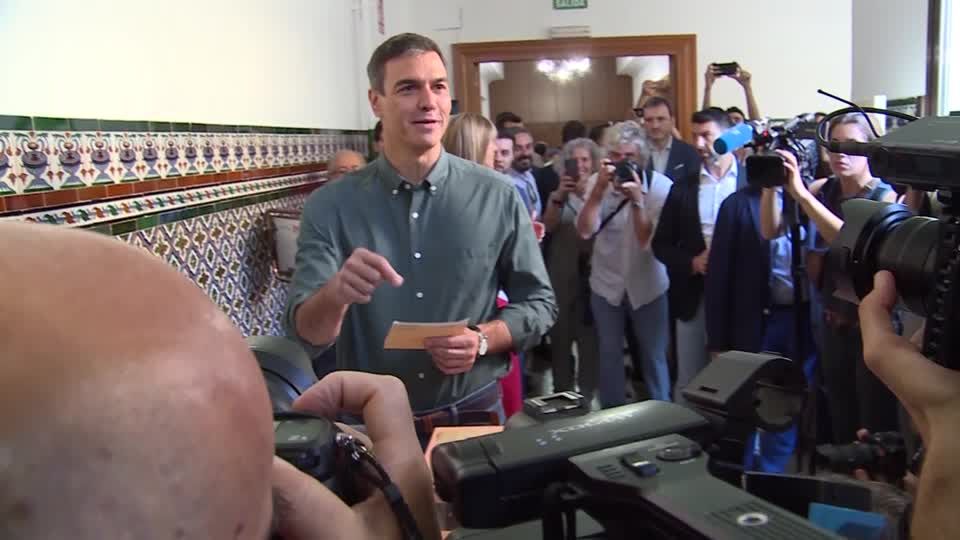The conservative People’s Party has won the parliamentary elections in Spain. Your top candidate, Feijóo, is claiming the post of head of government. However, even with the right-wing populists, it is not enough for a majority. The country is in for a stalemate.
The conservative opposition People’s Party (PP) won the parliamentary elections in Spain on Sunday, but missed an absolute majority in an alliance with the right-wing populist Vox. The EU’s fourth-largest economy, which will hold the EU Council Presidency until the end of the year, faces a long stalemate and possibly another election.
PP top candidate Alberto Núñez Feijóo claimed the post of head of government for himself in front of thousands of cheering supporters in Madrid, despite the lack of a majority. “I take on the task of starting negotiations to form a government,” said the 51-year-old. Although the PP was able to improve by 47 seats to 136 seats, even with the 33 Vox seats it is not enough for the absolute majority of 176 seats. At the same time, it was hardly foreseeable that other parties, in association with Vox, would help him to a government majority.
Right-wing populist Vox loses seats in parliament
Socialist incumbent Pedro Sánchez is also likely to have major problems initiating a new edition of his left-wing minority government. His party was able to improve by two seats to 122 seats. Its left-wing partner, the Sumar electoral alliance, got 31 seats. Together with smaller regional parties, with whose help he was elected to office in 2019, the socialist would only get 172 votes.
He would then be dependent on the intransigent Catalan separatist party Junts led by former regional head of government Carles Puigdemont, who was deposed in 2017 and won seven seats. However, Puigdemont, who lives in exile in Belgium, had previously declined to support either the PP or the PSOE. Junts boss Miriam Nogueras made it clear on election night that support would not be in vain. Junts is campaigning for a new independence referendum, if necessary against the will of the central government.
Vox, which lost 19 seats, made it clear on election night that it wanted to be in a Feijóo government or at least influence its program. You will not “give away” your own votes, said Vox Secretary General Ignacio Garriga. Vox boss Santiago Abascal also blamed Feijóo for the poor performance of the right camp. The PP candidate upgraded the PSOE by offering it a pact that each of the two major parties should support the candidate with the most votes, Abascal criticized.
Fratelli d’Italia success
Right-wing parties in Europe: where the continent is listing
Spain threatens political impasse
Spain’s right and right-wing extremists were “beaten” in the elections, Sánchez said after counting almost all the votes in front of supporters in Madrid. “The backward-looking bloc, which wanted to undo all the progress of the last four years, has failed,” said the socialist, referring to the lack of a parliamentary majority for a possible alliance between the PP and Vox. There are “many more people who want Spain to move forward than those who want to go backwards,” said the PSOE leader.
Feijóo reiterated his intention to “form a government”. He urged the Socialists not to “block” such a government.
However, if he fails to form a government, another election may be necessary. Spain could face a long stalemate. A “bloqueo”, a political blockade of the kind that occurred twice in a row after the 2015 and 2019 elections and required a second round of voting in each case, did not seem impossible.

Performance of the Socialists a “real surprise”
Like partner parties in Hungary and Poland, Vox has a very unique understanding of the rule of law. She is also Eurosceptic and calls for cashing in on prestige left-wing projects in the areas of social affairs, the protection of minorities and the environment, and for cracking down on separatists. There is no so-called firewall to the right in Spain, as there is in Germany against the AfD. In some regions, PP and Vox already rule together. A “grand coalition” is unthinkable in Spain. Sánchez does not even want to tolerate a PP minority government and therefore leaves him “no choice” but to talk to Vox, Feijóo emphasized several times.
On Sunday, parts of the Senate were re-elected in addition to the lower house “Congreso de los Diputados”. In Spain, however, the upper house plays no role in forming a government. The parliamentary elections were actually only planned for the end of the year. But Sánchez preferred it after the debacle of the left parties in the May 28 regional elections. The left-wing government repeatedly warned that a right-wing government would undo the social gains of recent years and set the country back decades. She went unheard.
Sánchez has ruled for five years, since January 2020 in a minority government with Podemos. The Left Party has since joined the Sumar Alliance.
Political expert António Barroso from the consulting firm Teneo described the Socialists’ performance as a “real surprise”. There are now “two scenarios,” he told the AFP news agency. Either “Sánchez stays in power or there are new elections”.
Around 37.5 million Spaniards were called upon to elect 350 deputies and 208 senators. Feijóo had said on election day: “Spain can start a new era”. Sánchez spoke of a “very important” choice for “the world and for Europe”.
Source: Stern
I have been working in the news industry for over 6 years, first as a reporter and now as an editor. I have covered politics extensively, and my work has appeared in major newspapers and online news outlets around the world. In addition to my writing, I also contribute regularly to 24 Hours World.




